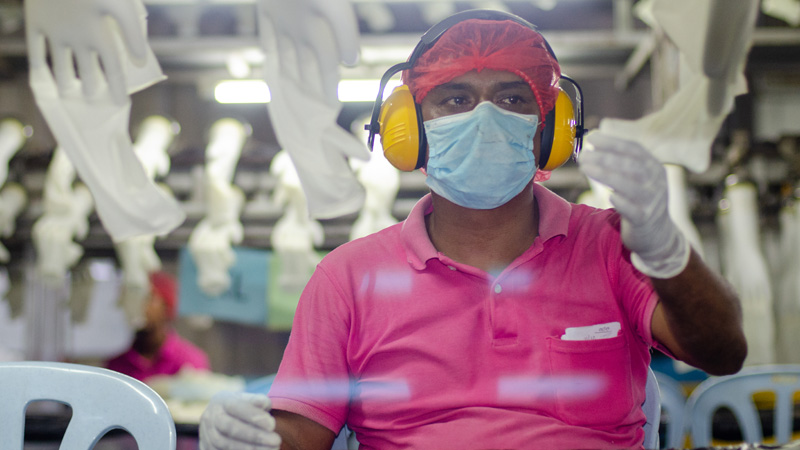Protein-free natural latex gloves – responding to the pandemic now, transforming the industry and supply chain for the future
24/11/2020

Research led by Cranfield University, in partnership with Malaysian surgical glove manufacturer, Meditech Gloves, is paving the way for a sustainable future for the degradable glove industry, as well as supporting the current response to the Covid-19 pandemic.
As the pandemic spread across the world during 2020, medical grade gloves became hot property – so much so enough material could not be produced to meet demands. Yet, synthetic gloves take more than 100 years to decompose and considering the volume used this year alone, the landfill sites are going to contain them for years to come unless we explore other solutions. By moving from oil-based nitrile to natural rubber, this research is poised to provide a short term respite in the face of the global pandemic, and crucially, transformational global implications by supporting supply chains the world over and positively impacting the environment.
The research between Cranfield University and Meditech Gloves actually started in early 2019, with Cranfield’s Professor Krzysztof Koziol and his team of PhD students working with the industry partner to investigate alternative methods for sustainable, high quality glove production. Krzysztof explains: “There is a huge issue that needs addressing in the glove industry, which has only been further highlighted by the pandemic. In Asia and Australasia the industry is dominated by synthetic nitrile glove production. More gloves means increasing chemical production from oil, increasing manufacturing efforts and energy consumption – followed by a 100 year decomposition cycle. Ultimately it is catastrophic for the environment.”
One major challenge to the research was that as a natural product, rubber trees produce certain proteins, which a small proportion of people are allergic to. In the past the skin allergies that originate as a result of the presence of these proteins have limited the use of natural rubber. However, at Cranfield the team has been working to deactivate the offending protein in the latex. By overcoming this challenge, the researchers have developed natural rubber gloves that not only biodegrade in less than one year, 100 times faster than its chemical counterparts, they are also sustainable and of higher quality, with the finer nature of the material fitting perfectly to the hand.
With raw materials comprising rubber plants, CO2 and solar energy, this is a solution that not only creates an environmentally friendly product, it is an opportunity to reignite a whole supply chain, supporting rubber plantations across the world – from Brazil to Thailand, Malaysia and Indonesia.
Meditech Glove’s Company President, Dr Effendi Tenang, is excited about the future: “We are aiming to become a leader in the sustainable production of degradable gloves. This will reduce CO2 and make us a more efficient producer of medical grade gloves, supporting a greener future that will benefit everyone.”
This will inevitably take time and requires increased planting of rubber trees to provide a sustainable pipeline of raw materials. The trees must be six years old before tapping for rubber begins and they may be tapped for up to 28 years. Krzysztof explains: “It is an opportunity to turn our industry towards a greener future. We now need to create a campaign for the whole industry to get behind. If we can, demonstrate the demand working with Meditech, so farmers across Asia, Southeast Asia and South America will see and realise the opportunity to supply natural rubber. This isn’t simply one story solving a current need – it is the whole social, economic and environmental story.” He continues: “By creating a supply chain for developing world farmers and the wider communities, we are forging a sustainable manufacturing cycle for the future and crucially absorbing carbon from the atmosphere via the raw source of the product.”
This study is a great example of how Cranfield’s academics and PhD students are working together with industry partners to solve major world challenges. Eva Peláez Álvarez, 1st year PhD student, explains: “What makes Cranfield University stand out is its strong connection with industry, providing a unique opportunity to work in sponsored projects solving real problems.” Eva and her fellow PhD students are now working on a further project with Meditech Gloves, a proof of concept that will further revolutionise the industry and take natural rubber into a new level. Krzysztof is excited about the future: “This presents a sustainable future, with net zero carbon manufacturing moving away from oil industry, and putting the rubber industry into a full circular economy cycle. It is important not to make shortcuts and mistakes of the past but instead enable manufacturing technologies which will serve us for several decades without side effects to overcome.”
We are seeing a post Covid-19 paradigm shift in the manufacturing of materials in many areas, with healthcare being a major beneficiary – for obvious reasons. This project, although originating prior to Covid-19, is intricately connected to the long term fight against the pandemic. Covid-19 is a wake-up call for governments and industry the world over, presenting a renewed focus for the manufacturing industry, and through this research, the natural rubber industry and developing world economies that will benefit.
Of course, it is not a win for everyone. The Big 5 oil producers will inevitably resist. But the social, economic and environmental implications speak volumes – the key now is to make fully degradable and allergens free gloves the long term solution for the global glove making industry. With Cranfield’s PhD students regularly accessing the Meditech Gloves plant they are focused on the rapid deployment of the findings direct from the laboratory into the real world and large scale production.
To find out more about this research and other examples of how Cranfield is working with industry to uncover a range of post Covid-19 paradigms in manufacturing, join our Manufacturing 2075 event on Thursday 3 December. Manufacturing 2075 will feature as part of Manufacturing and Materials Week at Cranfield University.
Categories & Tags:
Leave a comment on this post:
You might also like…
From Sri Lanka to Cranfield: How a Commonwealth Scholarship transformed my environmental engineering journey
Hi, I’m Kavithanjali Uthayashangar and I’m here to tell you about my journey into environmental engineering. It began with a simple but powerful motivation: a desire to understand how engineering can ...
Inside the Air Transport Management MSc: Classes, assignments, and group project work
What’s it really like to study Air Transport Management at Cranfield? Adit walks us through a typical day, assignment expectations, and the excitement of hands-on group projects. This is the second of three blog ...
Using Factiva to research a company
If you’re tasked with researching a company, your first port of call might be to search Fame or EBSCO Business Source Complete. Your immediate reaction might not be to look at Factiva. However, for larger ...
How do I write a secondary reference … in the NLM style?
Secondary referencing is used when you’re reading a work which includes a quotation from another author, and you – the researcher – can’t obtain the original source. We always advise, where possible, to try to ...
Reaching new heights: How a Global Excellence Scholarship fuelled my aerospace dreams
Leaving my home in India to pursue an MSc in Aerospace Dynamics at Cranfield University was a leap of faith. Hi, I’m Oliza Kachroo and as an international student, the transition ...
How do I reference…when delivering a presentation?
Just as you cite and reference sources in written work, you should also acknowledge the sources you use or quote in oral presentations. Citing your sources in presentations provides your audience with information about the ...






